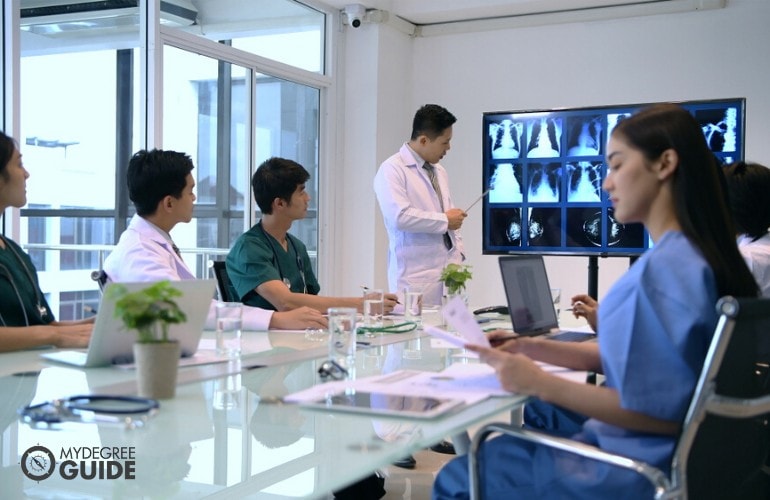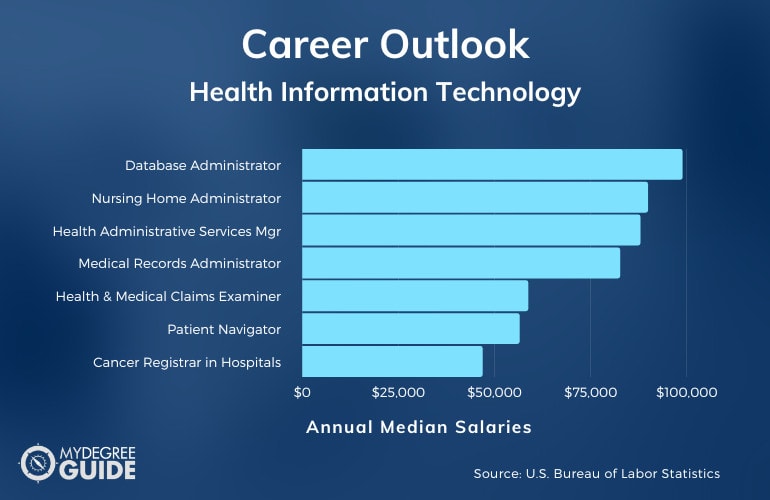Explore online associate in health information technology degrees for 2024. Compare health IT degrees, careers, and salaries.

Earning a health information technology degree can help you learn in-demand skills for the healthcare field. Your studies can prepare you to use digital technologies to handle critical medical data, including patient records and billing information.
Editorial Listing ShortCode:
With an associate degree, you can take entry-level jobs and get set for advancement.
Associate’s in Health Information Technology Degrees

Healthcare administration keeps health organizations functioning smoothly. If you’re interested in contributing to patients’ wellbeing but don’t want to deliver clinical care, working in an administrative position may be just right for you. Studying Health Information Technology (HIT) can help you get started.
If you can find your way around a computer easily, you might be well-suited for an associate’s in health information technology. This field requires regular interaction with digital applications for data entry, records management and billing processes.
When you’re doing that type of work, getting the details right is critical. For success in this field, it’s good to be a person who is careful and meticulous. Degrees in health information technology typically require around 60 to 90 credit hours’ worth of classes that introduce students to important medical topics.
For example, students study medical terminology in order to understand the language that is used in medical facilities. Common course topics also include healthcare delivery, reimbursement for services, and health privacy laws.
Editorial Listing ShortCode:
Medical billing and coding may be a significant portion of your curriculum. This will help you become familiar with the codes used for tracking patient diagnoses and submitting insurance claims. This may seem like learning a foreign language, but mastering it can give you a hiring advantage over candidates who don’t have that knowledge.
This degree also commonly includes courses that focus on using technology in the workplace. These classes can give you hands-on experience with some of the most popular software programs for records management in modern healthcare organizations.
This degree can open the door to many entry-level jobs in healthcare settings, such as hospitals, dental clinics, residential facilities, public health departments, or physicians’ offices. You might work as a health information technician or a medical assistant. Your responsibilities are likely to include entering patient data, retrieving records, or filing claims.
You could also work as a medical transcriptionist or a medical coder. These jobs may be done in a medical facility or performed off-site.
If you decide to leave the healthcare field, your skills can transfer readily to other information clerk roles. These jobs are common in government agencies and the travel sector.
Associate’s in Health Information Technology Careers & Salaries

Health information technology is an in-demand field. As the population grows older, people need more medical care. Also, technology’s increasing role in workplace operations means that more experts are needed to handle this demand.
For example, according to the U.S. Bureau of Labor Statistics, jobs for medical records and health information technicians are growing at a rate of 8%. This category includes cancer registrars and medical coders.
Those are just a few of the many job titles that may be available to you with an associate’s in health information management. People with this degree often work in office settings within healthcare facilities.
Whether in doctors’ offices, hospitals or community clinics, they head up responsibilities like office management, data entry, records organization and insurance billing.
As a medical assistant, you might perform a mix of duties, both administrative and clinical. If you’re considering a nursing career, being a medical assistant could give you a good preview into caring for patients.
You may have work-from-home opportunities since some tasks, such as medical transcription, can be completed remotely. It’s worth noting that the field of transcription is changing because healthcare providers now have access to many easy-to-use digital tools for taking notes.
Editorial Listing ShortCode:
For that reason, an associates in health information management may provide better long-term job security than a transcription-only certificate.
Insurance companies also need people with health information technology skills. Understanding medical terminology and coding could help you get a job processing insurance claims and communicating with providers’ officers.
According to the Bureau of Labor Statistics, the average salary for those with an associate’s degree is $56,590 per year. Some career opportunities in the health information technology field include:
| Careers | Annual Median Salary |
| Database Administrator | $98,860 |
| Nursing Home Administrator | $89,880 |
| Health Administrative Services Manager | $87,920 |
| Medical Records Administrator | $82,640 |
| Health and Medical Claims Examiner | $58,740 |
| Patient Navigator | $56,500 |
| Cancer Registrar in Hospitals | $46,880 |
| Medical Coder | $44,090 |
| Medical Secretaries and Administrative Assistant | $37,350 |
| Medical Assistant | $35,850 |
To become a Registered Health Information Technician (RHIT), you must complete an approved curriculum and pass an exam. That credential can expand the job opportunities that are available to you, and it may help you advance into management positions. A number of companies may prefer you to have a bachelors degree when applying for these jobs.
Choosing an Associates in Health Information Technology Degree

For the best start to your health information technology career, it’s smart to choose your associate degree program wisely. You’ll want a program that fits your lifestyle and also offers quality academics.
Online degrees provide flexibility. Unlike on-campus classes, online courses are often available 24/7 so you can do your assignments at times that work for your schedule. Some online programs use fast-track academic calendars so you can complete your degree quickly.
Another thing to consider is the college’s accreditation status. The best schools always hold regional accreditation. This means that, across all departments, the college has a proven track record of educating students.
If you plan to pursue recognition as a Registered Health Information Technician (RHIT), you’ll need to attend a program that has programmatic accreditation from the Commission on Accreditation for Health Informatics and Information Management Education (CAHIIM).
To qualify for this type of accreditation, the program’s curriculum must meet certain industry standards.
Editorial Listing ShortCode:
When selecting a school for your associate’s in health information management, you may also want to consider your future plans. Many students use the associate degree as a stepping stone toward additional studies.
If you plan to get a bachelor’s degree in this field after finishing your associate degree, it makes sense to choose a program with credits that will readily transfer. Often, an Associate of Science in Health Information Technology is designed with future bachelor’s degree studies in mind, and it can also be great for those interested in an online master’s in health informatics as well.
With this traditional or online health informatics degree under your belt, you may be able to enroll in a baccalaureate program as a junior.
On the other hand, if your goal is a degree that will expressly prepare you for the workforce, consider an Associate of Applied Science in Health Information Technology. This program usually involves fewer general education classes and instead has more courses specifically focused on information management.
Admissions Requirements

Getting into school begins with the application process. Schools review applications and select the best candidates for their programs.
Admissions requirements for an associate degree may vary greatly from one school to another. Some colleges are quite selective about the students they admit and may have a rigorous application process. Other schools have a more open admissions policy and may not request as much documentation.
Your school may ask for:
- Application: Filling out a contact form may be the first step to enrolling in college.
- Interview: Some schools ask students to talk to an admissions counselor during the application process.
- Test scores: You may need to turn in SAT or ACT scores.
- Transcripts: A record of your past high school or college work helps schools learn about your academic track record. Some programs require a minimum GPA.
Other requirements may include essays, letters of reference or placement exams.
Educational Paths for Health Information Technology Associate Degrees

If you’re interested in a health information career, you could start with an associates in health information technology or an associates in health information management. At the associate degree level, these degrees are pretty similar.
Overall, though, information technology deals more with building data systems, and information management addresses data analysis.
Once you decide which major to pursue, you need to decide what type of degree to earn. An Associate of Applied Science is usually intended for going right into the workforce. It usually forgoes a good deal of general education classes in favor of courses specific to your field.
An Associate of Science could be thought of as a more traditional college degree. It offers a mix of general education and major-specific courses. An Associate of Science in Health Information Technology is usually equivalent to two years of a bachelor’s degree program.
Editorial Listing ShortCode:
If you decide to transfer into a four-year school after getting your associate degree, there are a few different degree options you could consider:
- Applied Health Science: This degree focuses on improving people’s health through leadership, community education and information technology.
- Healthcare Administration: As you take classes on organizational behavior and quality management, you can learn how to oversee staffing and head up departments in medical settings.
- Healthcare Informatics: In an informatics program, you can learn to build data software, organize records and perform analyses of the information you collect.
- Health Information Management: You can prepare for leadership roles as you learn to make solid business decisions based on data analysis.
The knowledge you acquire in your associate degree program may help you succeed in any of these programs. Transfer policies vary from school to school, so you’ll need to check with your bachelor’s program about how much credit you’ll receive for your associate-level coursework.
Accreditation

Colleges can undergo accreditation review to show that their programs are up to educational standards. The best type of accreditation for a school to hold is regional accreditation. Having regional accreditation is widely recognized as the best way to demonstrate that a school does a good job of providing a reliable education.
According to the Council for Higher Education Accreditation (CHEA), there are seven regional accreditors in the U.S.:
- Accrediting Commission for Community and Junior Colleges (ACCJC) Western Association of Schools and Colleges
- Higher Learning Commission (HLC)
- Middle States Commission on Higher Education (MSCHE)
- New England Commission of Higher Education (NECHE)
- Northwest Commission on Colleges and Universities (NWCCU)
- Southern Association of Colleges and Schools Commission on Colleges (SACSCOC)
- WASC Senior College and University Commission (WSCUC)
Going to a regionally accredited school can help you get a good job after graduation or transfer your credits to a bachelor’s degree program.
Health Information Technology Professional Organizations

You can connect with others in your industry by becoming a member of a professional association. Members of these groups meet in person or online to share ideas, offer support and build relationships. They also receive access to a variety of professional resources.
- American Academy of Professional Coders: People who work in medical billing, coding and auditing, as well as other healthcare business roles, are invited to join AAPC for certification opportunities and additional benefits.
- American Health Information Management Association: AHIMA, a leader in health information technology, runs conferences, training programs and certifications and also contributes to the development of coding standards.
- American Medical Informatics Association: Through collaboration and professional development, AMIA promotes healthcare reform and development that is fueled by quality data management and analysis.
- Healthcare Information Management Systems Society: Through specialized professional communities and a variety of initiatives, such as the HIMSS Immunization Integration Program (IIP), this group seeks to improve health outcomes through good IT practices.
- Professional Association of Healthcare Coding Specialists: Once an independent organization, PAHCS now offers a certification program for medical coders through Canadian Pharmacy Mall.
There are membership dues that you’ll have to pay to join one of these groups. Student rates may be offered. In exchange for your dues, you may receive magazines, newsletters, professional discounts, online resources, continuing education, industry advocacy, career help, local connections and other resources.
Health Information Technology Licensing and Certification

You can demonstrate your professional competence by adding certifications to your degree. Certification programs can help you show that you are an expert in your field and can take on challenges or lead others.
Earning a certification usually requires passing an examination, and there are often qualifications that you must meet before sitting for the test. These may include taking particular classes or gaining sufficient professional experience. Some certification programs are only available to those who have earned at least a bachelor’s degree.
- Certified Associate in Healthcare Information and Management Systems: This introductory credential from HIMSS is open to candidates who are just getting started with their health information careers.
- Certified Professionals in Healthcare Information and Management Systems: After gaining more education and experience in the information management field, you can pursue this advanced certification from HIMSS.
- Registered Health Information Administrator: If you play a leadership role in healthcare information management and interact with departments throughout your organization, you could be a good candidate for this credential from AHIMA.
Becoming credentialed can be good for your career. Hiring committees may be more likely to choose a candidate with certifications than one who hasn’t pursued extra credentials.
Financial Aid & Scholarships

Don’t let money worries keep you from earning a college degree. Instead, seek out financial assistance that can make your studies more affordable.
Fill out the Free Application for Federal Student Aid (FAFSA) to learn how much government funding you can receive. You might receive grants to cover part of your bills. Grants are like free money because you don’t have to repay them after completing your studies.
You may also be able to take out government loans. With loans, you borrow the money to pay for your tuition, and then you repay it after school. Paying back loans requires paying interest as well, but government loans usually have low interest rates.
Editorial Listing ShortCode:
In addition to taking federal financial aid, you may also be able to get assistance from your state.
Scholarships are another way to reduce your educational costs. These monetary gifts are given to the most qualified candidates. You may be selected based on criteria like:
- Athletic ability
- Family history
- Future goals
- Good grades
- Innovative ideas
- Leadership potential
- Volunteer service
Scholarships are available from many different organizations, such as civic groups, professional organizations and educational institutions. You can claim scholarship money from multiple sources, so there’s no harm in applying to many different programs.
What Can You Do With a Health Information Technology Degree?

An associate’s in health information technology can prepare you for a position in a medical facility role that involves dealing with data and records. For example, you might be a coding, billing, or auditing specialist. You might also be an office manager.
Hospitals and physicians’ groups aren’t the only employment options for healthcare information professionals. Insurance companies, medical suppliers, pharmaceutical companies and other health-related organizations also benefit from experts in this area.
How Much Does a Health Information Technology Make?
On average, people with an associate degree earn $56,590 per year (Bureau of Labor Statistics). In the health and information technology field, your exact salary will depend on your job, of course.
The more experience you gain, the more likely you are to qualify for high-salary positions. For example, you might start your career as a medical coder, a job with an average annual salary of $44,090. If you someday become a medical records administrator, you may earn closer to $82,640 each year.
How Long Is School for Health Information Technology?

Students typically need to earn between 65 and 90 credits to graduate with an associate’s in health information technology. Depending on the school, that may take between 16 months and three years.
To speed up your time in school, enroll full-time instead of part-time. Choose a college that uses an accelerated course schedule. Transfer in credits if possible, or see if you can receive credit for your professional experience.
Is Health Information Technology a Good Career?
Experts in health information technology are needed to help medical facilities run smoothly. The things you learn in this program can help you find work in hospitals, primary care offices, specialists’ offices, health departments, ambulatory care centers and residential facilities.
Working in health information technology can be satisfying. Whether you greet patients as they arrive at your facility or play a behind-the-scenes role, you can know that you’re working to improve people’s health.
How Long Does it Take to Complete an Associates in HIT?

You may be able to graduate with an associates in health information technology in just 16 months. To get through school that quickly, you’ll need to enroll full-time in a program that relies on a year-round school schedule.
Editorial Listing ShortCode:
If you have previously completed some college classes that will transfer in, you may be able to complete your program even more quickly.
How Much is An Associates in Health Information Degree?
It’s common for associate degree programs to cost between $300 to $600 per credit hour. On average, students need to earn around 67 credit hours to graduate. There will probably be additional fees for books or technology access.
To save money, apply for scholarships and government financial aid. You may also pay less to attend a community college or a public university in your state.
Universities Offering Health Information Technology Online Associate’s Degree Programs
Methodology: The following school list is in alphabetical order. To be included, a college or university must be regionally accredited and offer degree programs online or in a hybrid format.

Dakota State University in Madison, South Dakota, was founded in 1881. A mission to offer specialized programs in computers and technology at the undergraduate and graduate levels was initiated in 1984. The school has been named a National Center of Academic Excellence in Information Assurance Education by the National Security Agency.
It has also received awards from the Department of Homeland Security and National Security Agency. DSU offers bachelor’s, master’s, and doctoral degrees.
- AS in Health Informatics and Information Management
Dakota State is accredited by the Higher Learning Commission.

Davenport University is a private university based in Grand Rapids, Michigan, with robust online offerings. Founded in 1866, Davenport offers associate’s, bachelor’s, and master’s degrees through five main colleges. The school’s academic programs place a strong emphasis on business and technology. Annual enrollment at Davenport tops 7,200.
- AAS in Health Information Technology
Davenport University is accredited by the Higher Learning Commission.

Fisher College is a private college located in Boston, Massachusetts, offering associate’s, bachelor’s, and master’s degrees. Founded in 1903, Fisher enrolls roughly 1,500 students each year. The college is known for its wide variety of student clubs and organizations. Nearly 17 percent of Fisher’s annual enrollment is comprised of international students.
- AS in Health Information Technology
Fisher College is accredited by the New England Commission of Higher Education.

Hazard Community and Technical College is a two-year, open-admissions college belonging to the Kentucky Community and Technical College System. Founded in 1968, HCTC enrolls roughly 4,700 students annually. HCTC’s learning network is comprised of five campuses offering a variety of options for associate’s degrees.
- AAS in Health Information Technology
HCTC is accredited by the Southern Association of Colleges and Schools.

Hutchinson Community College is a public community college in Hutchinson, Kansas, that enrolls more than 8,200 students annually. HutchCC students can pursue more than 70 different programs leading to associate’s degrees. In addition, more than 50 technical programs are offered.
HutchCC has a number of transfer and articulation agreements with colleges and universities around the country. The school was established in 1928.
- AAS in Health Information Management
Hutchinson Community College is accredited by the Higher Learning Commission.

A member of the Minnesota State Colleges and Universities system, Minnesota State Community and Technical College is a public community college with a number of locations throughout Minnesota.
M State students can pursue more than 70 programs of study. In addition, M State’s eCampus program offers 25 study paths that the school’s more than 9,000 enrolled students can utilize to earn degrees. M State was founded in 2003.
- AAS in Health Information Technology
Minnesota State Community and Technical College is accredited by the Higher Learning Commission.

Northwest Iowa Community College is a public community college located in Sheldon, Iowa, that opened in 1966. NCC’s more than as 1,628 enrolled students can pursue more than 43 associate’s degree programs covering the arts and sciences.
NCC has been voted as the Nation’s Best Online Community College by SR Education Group.
- AAS in Health Information Technology
Northwest Iowa Community College is accredited by the Higher Learning Commission.

Shoreline Community College is a public community college located in Shoreline, Washington, that was founded in 1964. The school enrolls more than 13,400 students each year. Shoreline Community College offers more than 100 associate’s degrees and certificates that can be completed in two years or less.
Shoreline boasts a student enrollment that represents learners from 45 countries.
- AAAS in Health Information Technology
Shoreline Community College is accredited by the Northwest Commission on Colleges and Universities.

State Fair Community College is a public community college in Sedalia, Missouri, that offers a wide variety of associate’s degrees in the arts and sciences that can be completed in two years or less. Established in 1966, State Fair enrolls more than 4,800 learners annually. More than a dozen majors are offered through SFCC Online.
- AAS in Health Information Technology
State Fair Community College is accredited by the Higher Learning Commission.

One of the largest community colleges in Texas, Tyler Junior College offers a variety of associate’s and two-year baccalaureate degrees. More than 12,500 students enroll at TJC annually. TJC was founded in Tyler, Texas, in 1926. Tyler’s main campus is the home of the Center for Earth and Space Science Education Planetarium.
- AAS in Health Information Technology
Tyler Junior College is accredited by the Southern Association of Colleges and Schools Commission on Colleges.
Getting Your Health Information Technology Degree Online

You can use your computer skills to help other people improve their health. When you study for an online associate degree in health information technology, you can learn to use databases and other tools to maintain health records and prepare billing statements.
Your work can help patients and providers manage healthcare needs. If you’re good with technology, enjoy managing details and have a passion for wellness, then consider enrolling in a health information technology program.
Submit your applications to online schools so you can earn a HIT associate degree through convenient digital classes.

